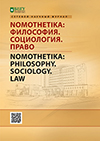Existential meanings of freedom in the creative heritage of A.S. Khomyakov
DOI:
https://doi.org/10.18413/2712-746X-2020-45-2-371-375Keywords:
Slavophiles, collegiality, integrity of the spirit, personality, Iranism and Couchines, willing mind, freedomAbstract
Turning to anthropological topics is a characteristic feature of philosophical reflections at different
stages of the historical development of mankind. Each era, possessing an integral and unique culture, proposed
its own solutions to this problem. A man, his inner world reacted in a certain way to external circumstances,
formed his own value outlook on the world, and also comprehended the meanings of his own freedom. Thus,
human models were formed in various historical eras. In this sense, the 19th century was no exception. But it
was precisely at this time that the polarization of thinkers' views on the problem of man, on his nature, essence
and purpose, and, consequently, the purpose and meaning of his existence, is most clearly manifested. Russian
philosophy at the center of its research posed the question of the integrity of human life as a universal center of
the world. Freedom is a key concept of the Slavophile worldview. Khomyakov was one of the first to consider
the problem of freedom through the prism of a Christian understanding of man. The interpretation of freedom
among the Slavophiles is different from the interpretation of free will and freedom of choice in Western
philosophical thought. Khomyakov puts love, divine love at the forefront of the individual’s freedom,
believing if a person is sinful and love can lead to selfishness that destroys the integrity of the individual.
Freedom as voluntariness in decision making based on love of God. Personal freedom, in his opinion, is
inseparable from the conciliar person. The article examines the categories of collegiality, “Iranianism” and
“kushitstvo”, “volitional mind”.
Downloads
References
Бердяев Н.А. 1936. О характере русской религиозной мысли XIX века. Современные
записки, 62: 309–343.
Бердяев Н.А. 1994. Философия свободного духа. М., Республика, 480 с.
Бердяев Н.А. 2001. О назначении человека. Опыт парадоксальной этики. В кн.: Путь в
философию. Антология. М., ПЕР СЭ; СПб., Университетская книга, 445 с.
Благова Т.И. 1994. Соборность как философская категория у А.С. Хомякова. В кн.:
Славянофильство и современность. СПб., Наука: 177–191.
Евлампиев И. И. Метафизическое измерение «русской идеи» (П. Чаадаев, В. Одоевский,
А. Хомяков). В кн.: Философский век. Альманах. Идея истории в российском просвещении. СПб.,
: 21‒52.
Замалеев А.Ф. 1995. Лекции по истории русской философии. СПб., Изд–во СПбГУ, 338.
Полторацкий Н.П. 1975. Русская религиозно–философская мысль XX века: Сборник
статей. Питтсбург, 413 с.
Хомяков А.С. 1994. Сочинения. В 2–х т. Т. 2. М., Московский философский фонд
Издательство "Медиум", 497 с.
Хоружий С.С. 2000. О старом и новом. СПб., Алетейя, 477 с.
Хоружий С.С. 2002. Современные проблемы православного миросозерцания. М.,
Омега: 144 с.
Чаадаев П.Я. 1989. Сочинения. М., Правда, 655 с.
Чаадаев П.Я. 1989. Статьи и письма. М., Современник, 623 с.
Abstract views: 797
Share
Published
How to Cite
Issue
Section
Copyright (c) 2020 NOMOTHETIKA: Philosophy. Sociology. Law

This work is licensed under a Creative Commons Attribution 4.0 International License.


